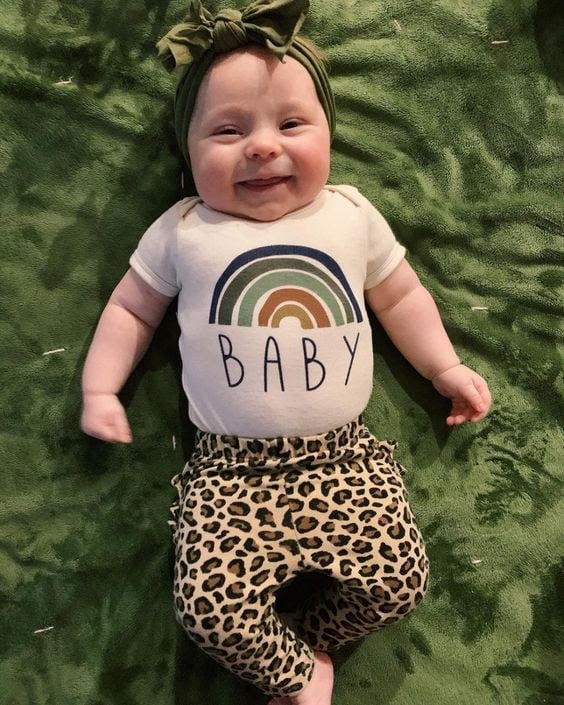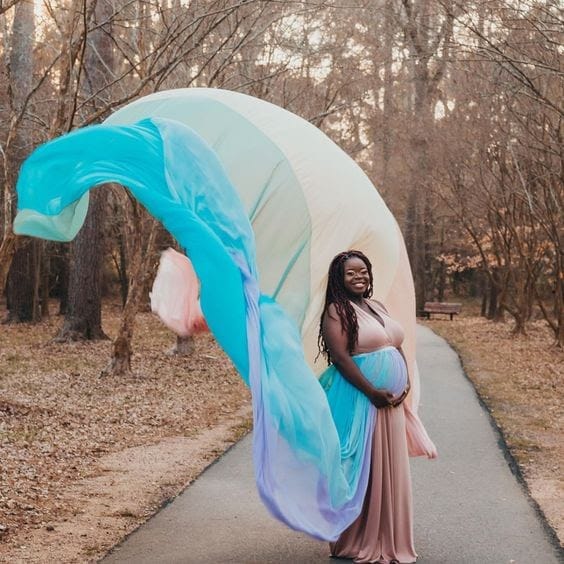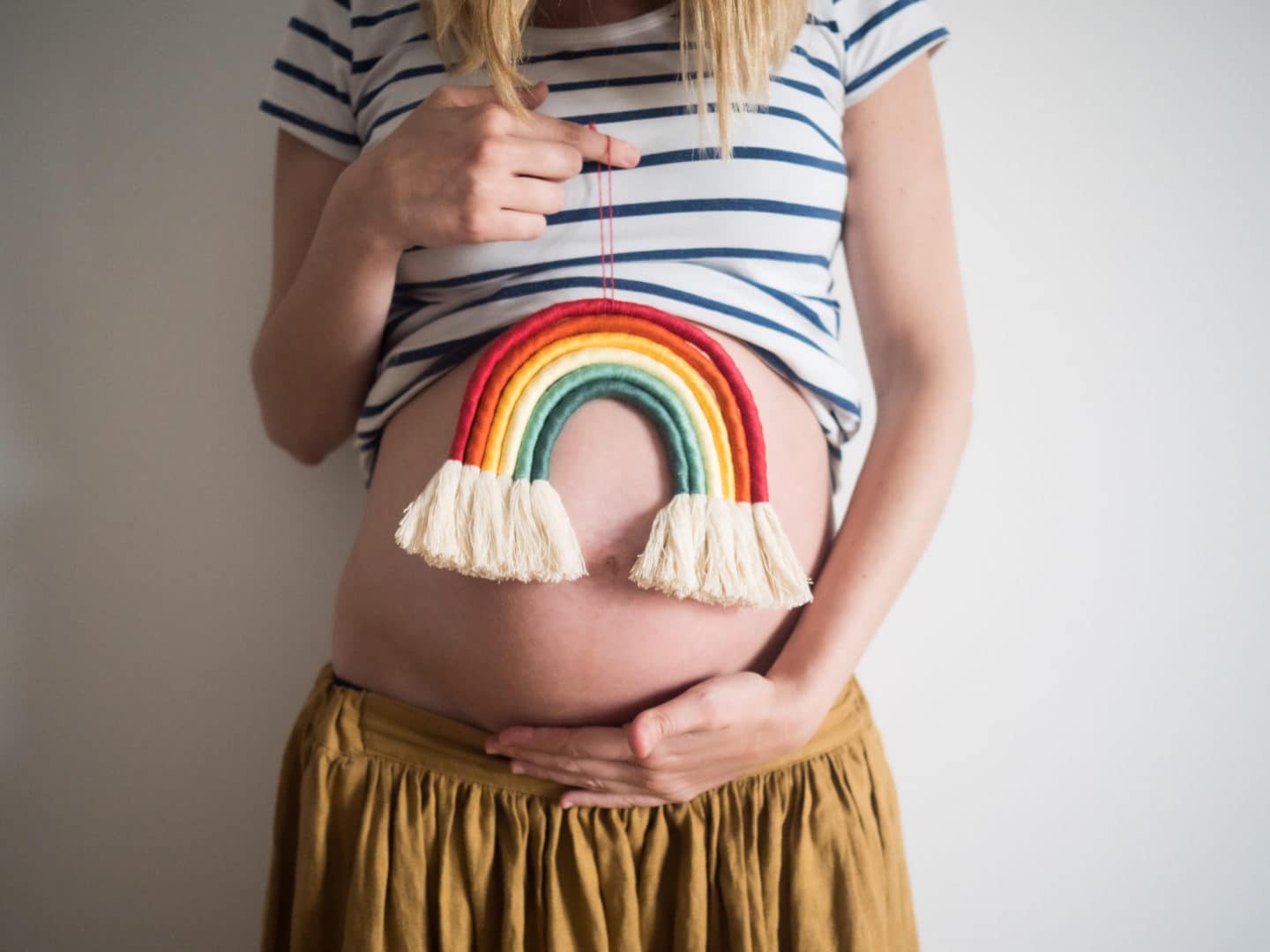For families who have experienced the devastating blow of a miscarriage or other perinatal loss, becoming pregnant, or even welcoming a child, isn’t always cause to pop the proverbial champagne. In reality, pregnancies and births that follow a loss are often confusing and anxiety-ridden for parents. However, they’re also a symbol of hope after turbulent times — hence, the term rainbow baby.
“A rainbow baby refers to the subsequent baby after a perinatal loss, miscarriage or stillbirth,” explains Ruthie Arbit, a maternal and pediatric psychotherapist in Washington D.C. and the director of Arbit Counseling. “Like a rainbow after a storm, the rainbow baby signifies hope, renewal and a new beginning.”
Here’s the story behind the term “rainbow baby,” often used in emojis and hashtags and emblazoned on onesies, along with expert and real-parent thoughts on the increasingly popular turn-of-phrase.
What does “rainbow baby” mean?
According to the support organization Pregnancy After Loss Support (PALS), the term rainbow baby stems from a quote from author Shannon L. Adler, “After every storm, there is a rainbow.” The metaphorical storm being perinatal loss, which could be a miscarriage, ectopic or molar pregnancy, stillbirth, neonatal death or other type of loss; and the rainbow being the baby, which, in many ways, is a tangible harbinger of hope for families. While commonly associated with babies that are born via pregnancy from the parents who experienced the loss, a rainbow baby can also be a child who’s adopted or born via surrogate after a loss. (Some women on social media refer to a baby after two subsequent losses as a double rainbow baby.)
Other terms parents who have experienced loss may use for children are “sunshine baby” and “pot of gold baby,” according to PALS. The former refers to a child who came before loss, signifying a sort of naiveté that’s impossible for parents to ever revert to, and the latter indicates a child that comes after a rainbow baby — the pot of gold at the end.

Thanks to the destigmatization of pregnancy and child loss, the term rainbow baby is pervasive on social media (at the time of writing, the hashtag #rainbowbaby has 2.2 million posts on Instagram — and this excludes similar hashtags like #rainbowbabyshower, etc.), but the term dates back over a decade.
When did the term “rainbow baby” start?
In 2008, the phrase was used in author Christie Brooks’ book “Our Heartbreaking Choices: Forty-Six Women Share Their Stories of Interrupting a Much-Wanted Pregnancy.” “I have since gone on to have another healthy baby (yes, a girl),” Brooks wrote in her essay, “Even the Darkest Cloud Has a Silver Lining.” “She is my rainbow baby.”
How long after a miscarriage is a rainbow baby?
While popular on social media and in community forums online, the term rainbow baby is not an official medical term, so ultimately, the decision when — if at all — to use it is completely personal. Some women refer to their unborn child during a pregnancy following loss as a rainbow baby while others, more cautiously, refer to it as a rainbow pregnancy.
It’s also worth noting that not everyone is on board with the term. Some women, despite having healthy babies after loss, refrain from using the phrase at all, out of the belief that a rainbow connotes an overall happiness and closure that they don’t wholeheartedly feel. The grief is still there, even if there’s joy.
What complex emotions surround rainbow pregnancies and rainbow babies
While pregnancies and babies are hopeful events after a loss, they’re also often fraught with anxiety and fear. “Most families have complex emotions associated with their rainbow baby,” says Arbit. “They remain haunted by memories of their prior losses and grapple with intense anxiety and worry around their rainbow baby pregnancy, delivery or postpartum period.”
Meghan A., a mom of two in Albany, New York, reveals that after getting pregnant following a miscarriage at 12 weeks, she could barely sleep. “I was constantly plagued with anxiety,” she says. “I dreaded every checkup because I was sure my doctor was going to tell me something was wrong. My husband and I didn’t even pick out a name until after I gave birth.”
In addition to fear, there’s also sorrow and guilt. Arbit explains that many families describe living with a “hole” or void that can never be filled — even after a subsequent pregnancies or birth. “There can be tremendous guilt over having these mixed emotions and guilt over why the rainbow baby survived and prior pregnancies did not,” she notes. “Additionally, some wonder if they’re to fault in some way over the loss.”

How to honor loss while celebrating new life
Even though the birth of a rainbow baby is joyous and cause for a sigh of relief, as Arbit noted, that’s not to say it wipes away the grief of what happened prior. It’s important for parents to remember that, while it can be weird to have such contradictory emotions, it’s perfectly OK.
“It’s completely normal to feel celebratory one day and panic or grief-stricken the next when you’re pregnant or give birth after a loss,” says Kristen Mosier, licensed marriage and family therapist and owner of Space for Systemic Healing in New York City, who notes that talking to a therapist can help parents sort out their conflicting feelings. “Some feel guilty for being sad or ambivalent about their current pregnancy or baby, but it’s important to remember that experiencing a variety of emotions isn’t uncommon at all,” she says. “Parents should honor all the feelings that arrive and remind themselves that there is no time limit to grieving a loss.”






